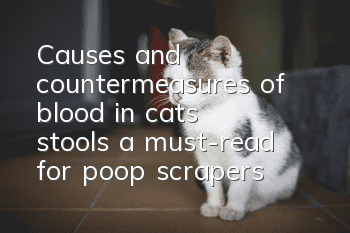Causes and countermeasures of blood in cats’ stools, a must-read for poop scrapers!

What should I do if my cat has blood in his stool?
The causes and countermeasures of blood in his stool are a must-read for cat scavengers! Blood in his stool refers to gastrointestinal bleeding and is also one of the symptoms of gastrointestinal diseases. If the owner suddenly suddenly If you find that your cat has blood in the stool, you must be very anxious, because certain infectious diseases can also cause blood in the stool, such as cat distemper, which changes color when smelling and has a very high mortality rate. Of course, blood in the stool is not necessarily an infectious disease. It is just ordinary constipation. Blood in the stool may also occur, which needs to be judged based on other symptoms and corresponding examinations. Although general blood in the stool is not a big problem, it still needs timely treatment.
1. Indigestion
Without correct dietary rules, cats often eat too much or are not adapted to food, causing diarrhea, especially kittens. Generally, it does not cause changes in appetite, the frequency of stools does not increase, and the stools are light yellow, sour or foul-smelling, or even bloody. The treatment is conventional antidiarrheal, fasting for 7 or 8 hours first, and then taking probiotics to regulate the intestinal flora and promote Digestion usually returns to normal in two or three days.
2. How to deal with blood in the stool caused by constipation
Constipation caused by factors such as single feeding, insufficient drinking water, and low exercise is called primary constipation. Constipation caused by intestinal displacement, accumulation of a large amount of indigestible things in the intestine, severe calcium deficiency leading to deformation of the lumbar spine, depression of the rectum, and compression of the abdominal or pelvic mass is called secondary constipation.
For primary constipation, 5~20ml of glycerol can be used for enema. If the cat is constipated for a long time and has large feces, you can use Kaiselu enema. After the liquid is injected into the rectum, use a cotton ball to block the anus for a while before letting it defecate. Cats with severe constipation may need to consider surgical treatment.
In order to prevent cats from experiencing constipation symptoms again, it is recommended to ensure sufficient and fresh water sources during daily feeding, pay attention to the mix of cat food, and add probiotics to cat food to improve gastrointestinal flora, and for the elderly Cats should increase their intake of fiber-rich foods; avoid allowing cats to eat foods that are difficult to digest, and have their anal glands checked regularly.
3. Internal Parasites
When there are parasites in cats, such as tapeworms, they will adsorb on the small intestinal membrane, causing mucosal damage and intestinal inflammation. Tract inflammation can lead to early intestinal mucosal bleeding in severe cases, and tapeworms continue to irritate the intestines, causing intestinal dysfunction, loose stools, blood in the stool, etc.
So our method of prevention and control is: when the cat is three months old, deworm the cat’s body and take some deworming drugs such as Cat Cleansing, but it should be noted that it can only be used when the cat is normal. Only under certain conditions. If diarrhea, vomiting, etc. occur, give the cat probiotics first, and then feed the cat medicine after it recovers.
4. Gastroenteritis
Compared with the previous symptoms of loose stools and bloody diarrhea caused by indigestion, it is more serious, and loose stoolsViolent, with pus and blood in the stool, the treatment is mainly systemic anti-inflammatory and symptomatic treatment, such as taking oral gentamicin, drinking 20,000 units each time, twice a day, and taking probiotics after 2 hours. Generally, the treatment time is not Too long, it should be within a week.
But if it is found that the cat’s feces is liquid black and has a fishy smell. In addition, the cat is also accompanied by vomiting. This disease may be fatal, so you should seek medical attention as soon as you notice the signs. In addition to the above symptoms, sick cats often have symptoms such as elevated body temperature, flushing of the conjunctiva, heavy tongue coating, dry mouth with foul odor, and convulsions. When gastroenteritis is suspected, food should be stopped for 24 hours and drinking water should be restricted. After being sent to the hospital, the doctor will decide what kind of drug treatment to use based on the severity of the inflammation.
5. Cat Distemper
Severe diarrhea, fishy feces, mostly bloody, accompanied by severe vomiting, not eating, fever, and poor energy. The death rate is very high, and confirmed by blood routine. Generally, it is very dangerous if the white blood cell count is less than 2,000. The possibility of success is relatively small. The smaller the cat, the higher the death rate. Timely treatment is required. The treatment time is about a week, and the white blood cells will rise to 3 or 4 days. Within the normal range, the treatment was considered very smooth.
For the diagnosis of the bleeding site of blood in the stool, we can distinguish it according to the color of the bleeding. For example, if the bloody stool is black, similar to tar, then the bleeding site is usually in the stomach and small intestine. If the bloody stool is bright red or dark, the bleeding site is usually in the stomach and small intestine. If it is red, it means that it stays in the intestine for a short time and it is bleeding in the back part of the intestine, such as the large intestine or rectum.
In addition, some veterinarians will use Yunnan Baiyao to treat blood in the stool. Yunnan Baiyao does have a hemostatic effect, but it is suitable for humans after all. Some ingredients may cause other problems for cats. Therefore, although Yunnan Baiyao can stop bleeding, it can only be used in appropriate amounts unless the blood in the stool is very serious and there is no other way to stop bleeding.
To prevent cats from having blood in their stools, parents must take good care of their cats in their daily lives. In terms of diet, you should choose healthy and non-toxic foods, and avoid hard and irritating foods. The best food for cats should be professional cat food and other cat foods.
In addition, cats must be dewormed internally and externally regularly to prevent the breeding and reproduction of parasites. If conditions permit, it is best to take pet cats for physical examinations 1-2 times a year to detect health problems in time and treat them promptly to avoid serious situations similar to blood in the stool.
- Why does a cat's eyes bleed yellow?
- 4 tips to teach you how to train a Siamese cat and make a well-behaved cat!
- Is it normal for kittens to poop black?
- What should I do if my pet cat loses hair?
- Burmese cat food taboos
- Attention! Cat grass and catnip are not the same thing~
- How long does it take for a cat to take off its collar after applying ringworm medicine?
- Basic home physical examination for cats
- Symptoms of pica in cats How to stop cats from eating foreign objects
- What are the symptoms of dystocia in pet cats?



